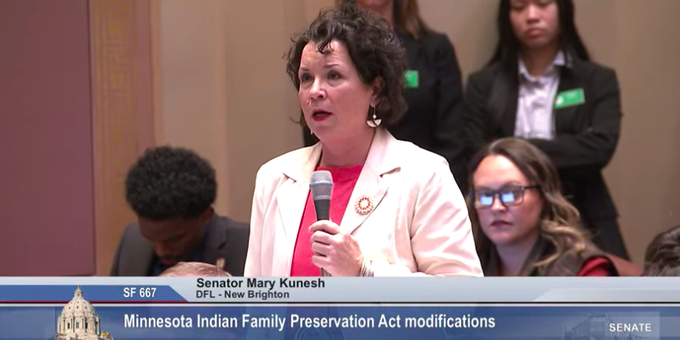MN Senate votes to support Native rights
On February 27, the MN Senate took an important step toward justice. By a 67-1 vote, they passed SF667, introduced by Sen. Mary Kunesh, bolstering the MN Indian Family Preservation Act, which provides critical support for Native children, ensuring that a child’s family and tribe MUST be involved in adoption or foster placement decisions.
It is imperative that we uphold strong protections for Native children at a state level because The U.S. Supreme Court will soon be weighing whether to strike down the federal 1978 Indian Child Welfare Act, which protects Native children on a federal level.
Why ICWA protections are so important
The Indian Child Welfare Act (ICWA) was passed federally in 1978 to address the fact that large numbers of Native children were being taken from Native parents, caregivers, and communities by state child welfare and private adoption agencies. 25-35% of Native children were being removed and 85% of those children were placed outside of their families and tribal communities, even when appropriate relative placements were available. In Minnesota, 97.5% of Native children removed from their homes were placed with non-Native families. These actions were part of an intentional and strategic plan by the U.S. government to eradicate Native cultural practices, kinship structures, and families, and to erode tribal identity and tribes themselves.
Learn more about ICWA and the upcoming U.S. Supreme Court case – (often called the “Brackeen” case), by listening to the excellent Season 2 of the podcast This Land. That legal case has the potential to extend far beyond ICWA to attack the basic principles of Tribal sovereignty.
Why is Native Sovereignty a Climate Justice Issue?
First and foremost, Native rights and tribal sovereignty are climate justice issues because our fates are interconnected as part of a thriving and interdependent planet of living relatives.
Native people are the first stewards of this land, and have spent generations living in relationship with the planet and with all of its beings. It is no accident that all major fossil fuel companies and extractive industries have built their profits on violations of Native sovereignty. When we strengthen Indigenous rights, we build our capacity as a movement to resist fossil fuel extraction and corporate power grabs, and we nourish our capacity to heal towards interconnection and right relationship.
In service of these principles, MNIPL has joined with Honor the Earth and organizations around the state to create the Rise and Repair Advocacy Platform for Climate Justice and Indigenous Rights. Click on this link to learn how strengthening protections for Native families and tribes interweaves with a climate justice agenda, and to learn you can become part of the Rise and Repair initiative. We will be following the progress of SF 667 and the House version of the bill, HF1071, as well as the Brackeen case. We will keep you updated on ways to take meaningful action in support of Native rights and tribal sovereignty.

